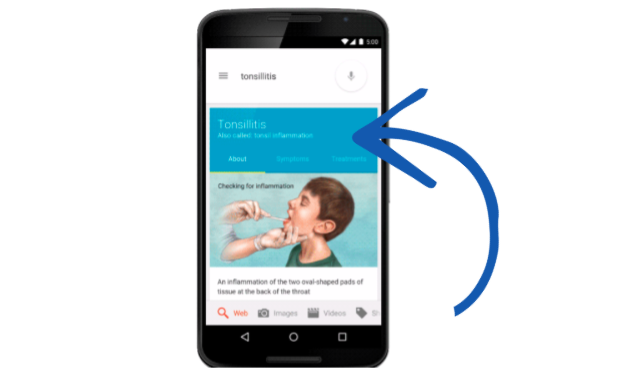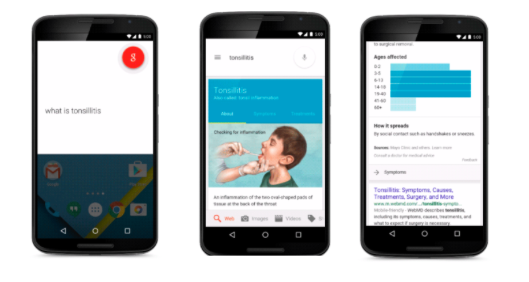One in 20 searches is for medical information, and Google’s hastening the process of delivering answers. According to Pram Ramaswami’s post in the Official Google Blog, Google is taking the guesswork out of medical questions by incorporating it into its Knowledge Graph technology.
Starting February 10, 2015 in the United States, and rolling out globally thereafter, Google search results will provide direct answers to health-related questions, including:
- Typical symptoms
- How common it is
- What ages it affects
- How contagious it is
- General information about treatments
- Whether you should seek immediate medical care
- Illustrations from medical professionals
Here’s a glance at what it will look like on smartphones, according to Google:
Fast access to quick facts – not in-depth diagnoses
In an effort to give users the most accurate information quickly, Google partnered with a team of medical doctors to produce the written content, graphics and charts for these results. Then, the search engine consulted with doctors from the Mayo Clinic and its own team to confirm the information provided is correct.
Ramaswami asserts this is not meant to replace consultation from a medical professional. Rather, it’s meant to be:
- A starting point for conversations with a doctor
- A introduction for more thorough research
- A quick answer to immediate medical questions*
*Ramaswami says he wished there were such a feature when his young son fell down and he wanted to reference the symptoms of a concussion.
Additionally, Senior Vice President and Software Engineer Amit Singhal told USA Today that he hopes it will distribute valuable information to people who might not otherwise have immediate access to medical help.
“When you’re a parent in India or Brazil or sub-Saharan Africa, and your child is sick and all you might have for help is your smartphone, this information might really matter,” Singhal said.
Coincidentally, latest Panda update targeted medical content
Theoretically, this will divert searchers away from other medical reference sites that offer thin content or inaccurate information about health conditions.
Not surprisingly, this was a category targeted in the latest Panda update. Searchmetrics analyzed which sites were hit hardest by the algorithm in October 2014, reporting some medical resources were targeted alongside lyrics sites and online games. Since then, Google has also started showing lyrics directly in results pages, potentially taking clicks and traffic away from the pages previously providing the same information.
Medical sites need to offer additional value to stand out
The health care community has been a prime beneficiary of the movement toward high-quality web content. Practices and providers that published valuable (and trustworthy) references to customers’ questions had the opportunity to improve their search visibility and capture clicks.
This update suggests health care companies can’t afford to offer generic information, or they’ll be outranked by Google’s Knowledge Graph answers. The pressure is on to provide value beyond what’s at the surface. As Singhal has notably stated, Knowledge Graph content is meant to be the Swiss Army knife of answers – an all-purpose tool that can offer quick assistance.
Companies that want to rank at the top of SERPs – and beat Google’s direct answers – need to be a specialty tool that helps consumers get a specific job done from start to finish. Instead of an overview of symptoms, a health care provider could feature a Q&A with one of its physicians, a recap of the latest medical research it conducted or an infographic that provides deeper information about contagions, treatments, symptoms, etc.
For more information, review these related resources:







